How to Start a Food Truck Business in Chicago, IL
City laws in Chicago make it tough (and confusing) to operate a food truck business, but that doesn't mean it's impossible. Some very successful food trucks operate in the city, and yours can too.
loading...
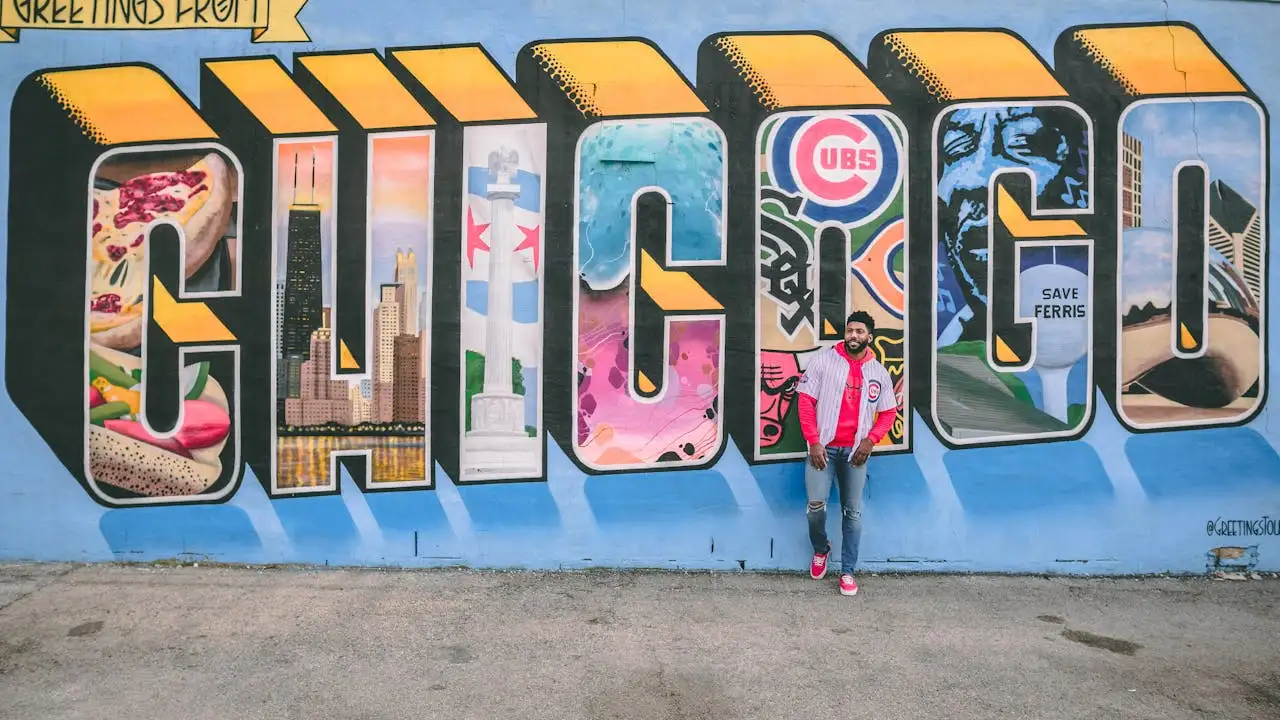
With a large consumer base and a vibrant food scene, Chicago is an ideal location for food trucks!
Why Start a Food Truck in Chicago?
Steps to Start Your Food Truck Business in Chicago
Step 1: Research & Plan Your Food Truck Business
Step 2: Obtain an Employer Identification Number (EIN) from the IRS
Step 3: Obtain an Illinois Department of Revenue (IDOR) Account ID Number
Step 4: Obtain the Necessary Insurance for Your Food Truck Business
Step 5: Choose Your License Type
Step 6: Complete and Submit Your Food Truck License Application
Step 7: Get Through Health and Fire Safety Checks
Step 8: Have Your Mobile Food Vehicle Assessed
Step 9: Find Prime Locations Where Your Food Truck Can Thrive
Step 10: Use Social Media to Market Your Food Truck
Step 11: Assemble a Reliable Crew to Run Your Food Truck
Step 12: Prioritize Effective Waste Management for Cleanliness
Step 13: Ensure Your Food Truck Has Reliable Access to Utilities
Step 14: Provide a Comfortable Dining Area to Improve the Customer Experience
You've made the big choice to start your food truck in Chicago! Now comes the hard part: making plans for how to get your food truck Chicago dream on the road.
Not only is this city famous for its skyscrapers, but also for its wide range of food options. A food truck business in Chicago can quickly become a favorite spot for many people who are always on the go.
But first you need to take care of a few things. You'll need to get the right permits, know the rules in the area, and have a good business plan for food trucks in Chicago.
So let's get started and learn all the steps of how to start a food truck business in Chicago.
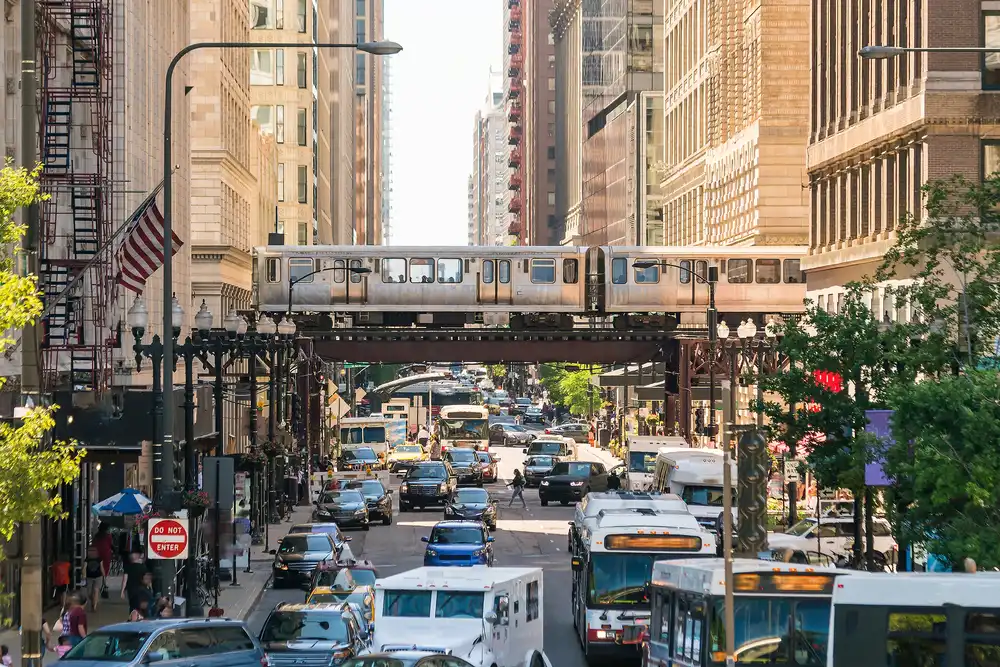
Chicago is a great place for food trucks! Let's learn how.
Why Start a Food Truck in Chicago? (top)
People from all over the world come to Chicago to enjoy its diverse food scene. Local food culture is very lively, which makes it a good place for food trucks.
With nearly 2.7 million residents, there are plenty of potential customers to serve.
Of course, the cold months in the city are hard. To place an order, people have to wait in line, which can be challenging when it's cold outside.
But there are ways to address it!
Parking your food truck near busy complexes, malls, or office buildings can attract customers who are eager for a quick and tasty meal without spending too much time in the cold. You might also consider participating in popular indoor events where you can set up and serve your delicious dishes in a cozy environment.
You can also prepare for the cold days by offering hot beverages or comfort foods that keep your customers warm and satisfied. Adding heaters around your food truck can make the waiting experience more pleasant.
Some food trucks also find it helpful to reduce operations on particularly harsh days.
If you want to learn how to start a food truck in Chicago, you need to know where to park. Key to success are places with a lot of foot traffic.
You can do well in this Windy City if you pick good spots and adapt to the weather conditions well.
Create a User Account At This Point
Several steps in this article will require you to interact with the Chicago Business Direct website.
If you attempt to do anything through the Chicago Business Direct portal, keep in mind that you are expected to create a user account first, which includes providing your email address, setting up a password, and verifying your identity by uploading a government-issued photo ID.
There is a slight waiting period as your account is pending review and approval, so it is best to create your user account now rather than later, so you can easily follow along with the steps outlined in this article.
The details of the sign up process are outside the scope of this article, but you can start the process at the following link: https://webapps1.chicago.gov/AccountServices/login.jsp
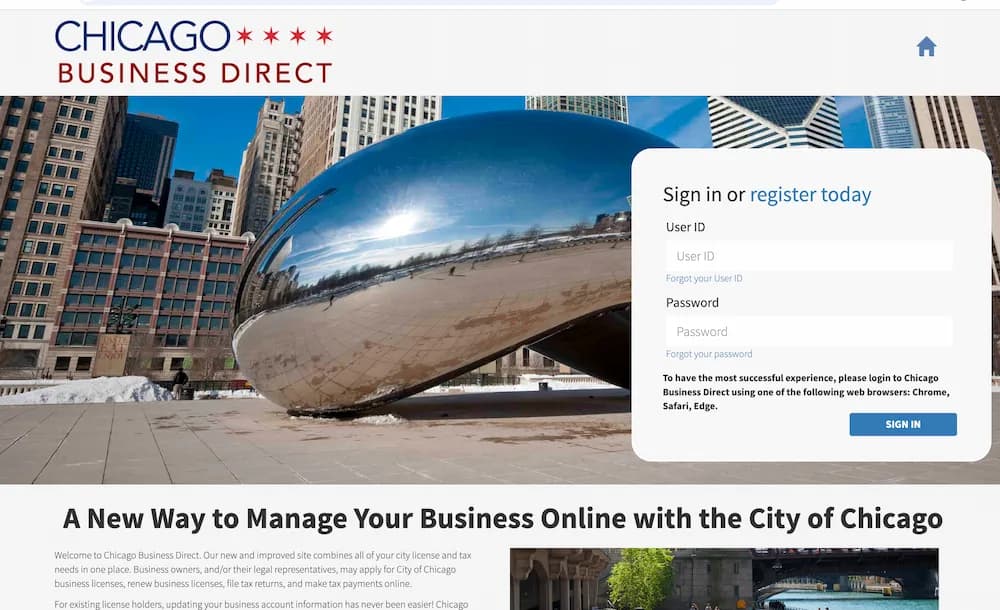
Steps to Start Your Food Truck Business in Chicago (top)
You must be excited to start a food truck business in Chicago.
The city's food scene is lively, and there are many people eager to sample new dishes.
If you're wondering how to open a food truck in Chicago, follow these simple steps, and you'll be on your way to success.
Step 1: Research & Plan Your Food Truck Business (top)
Opening a food truck business in Chicago is a promising venture. But if you jump in without a plan, things could go wrong. It is very important to take the time to research and plan. This will not only help you succeed, but it will also help you get investment as well.
How can you do it? Let's find out!
✅ Create a Solid Business Plan
First off, you need a solid business plan. This plan is like your roadmap. It will guide you through each step of starting your food truck.
Begin by clearly defining your food truck concept. What type of food will you offer? What makes your food unique?
Next, identify your target market. Think about who your customers are. Are they young professionals, families, or students? What are their food preferences and spending habits?
Finally, outline your marketing strategy. How will you spread the word about your food truck? Consider using social media, loyalty programs, and even partnerships with local businesses.
✅ Mark Your Financial Projections
Now, let's talk about money. It's important to develop a detailed analysis of your financial projections.
This means figuring out your startup costs, potential revenue, and ongoing expenses. Knowing these numbers will help you make informed decisions.
Plus, it will make it easier to gain the confidence of potential investors or secure a loan from the bank.
✅ Choose a Suitable Business Structure
Another big decision is choosing a business structure. This choice will affect your taxes, liability, and other factors. You have a few options here.
One option is being a Sole Proprietor. This is the simplest form, where you are personally responsible for all the business debts and liabilities.
Another option is a Limited Liability Partnership (LLP). This structure provides liability protection to each partner, so you are not personally liable for the business debts.
Lastly, there's the Corporation structure. This one treats the business as a separate legal entity. It offers more liability protection but comes with more regulations and higher setup costs.
✅ Sole Proprietor: The simplest form, where you and the business are the same legally.
✅ Limited Liability Company (LLC): A separate legal entity that protects your personal assets.
✅ Corporation: A more complex structure, taxed separately from its owners.
You can register your business structure through the Illinois Secretary of State's office .
Step 2: Obtain an Employer Identification Number (EIN) from the IRS (top)
Similar to a person's Social Security number, your company needs an Employer Identification Number (EIN). It's needed for taxes and absolutely necessary to open a business bank account. You can apply for an EIN on the IRS website.
The good news is it's free. The application process is simple, and you will get your EIN immediately upon completion.
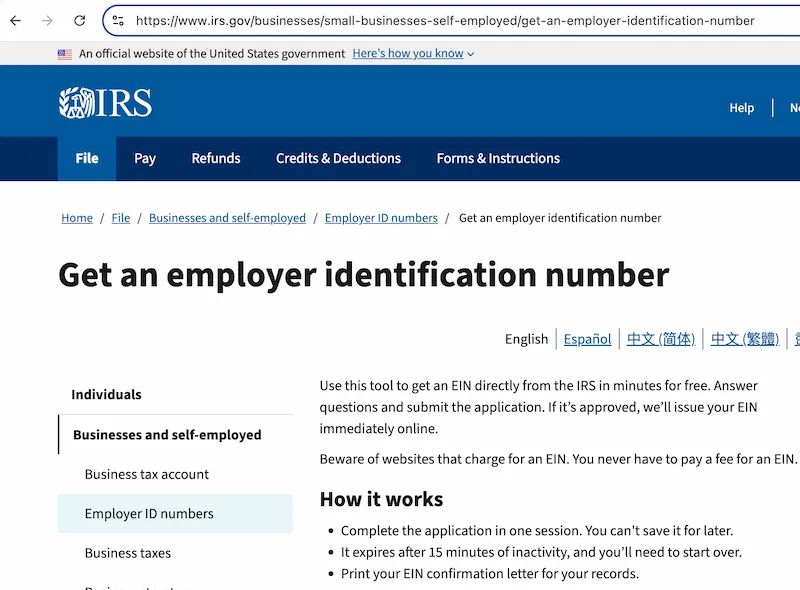
You can apply for an EIN on the IRS website
Step 3: Obtain an Illinois Department of Revenue (IDOR) Account ID Number (top)
To operate legally in Illinois, you need to register your business with the Illinois Department of Revenue (IDOR). This involves getting an Account ID Number. This number is necessary for paying state taxes, including sales tax.
You can register online at the IDOR website.
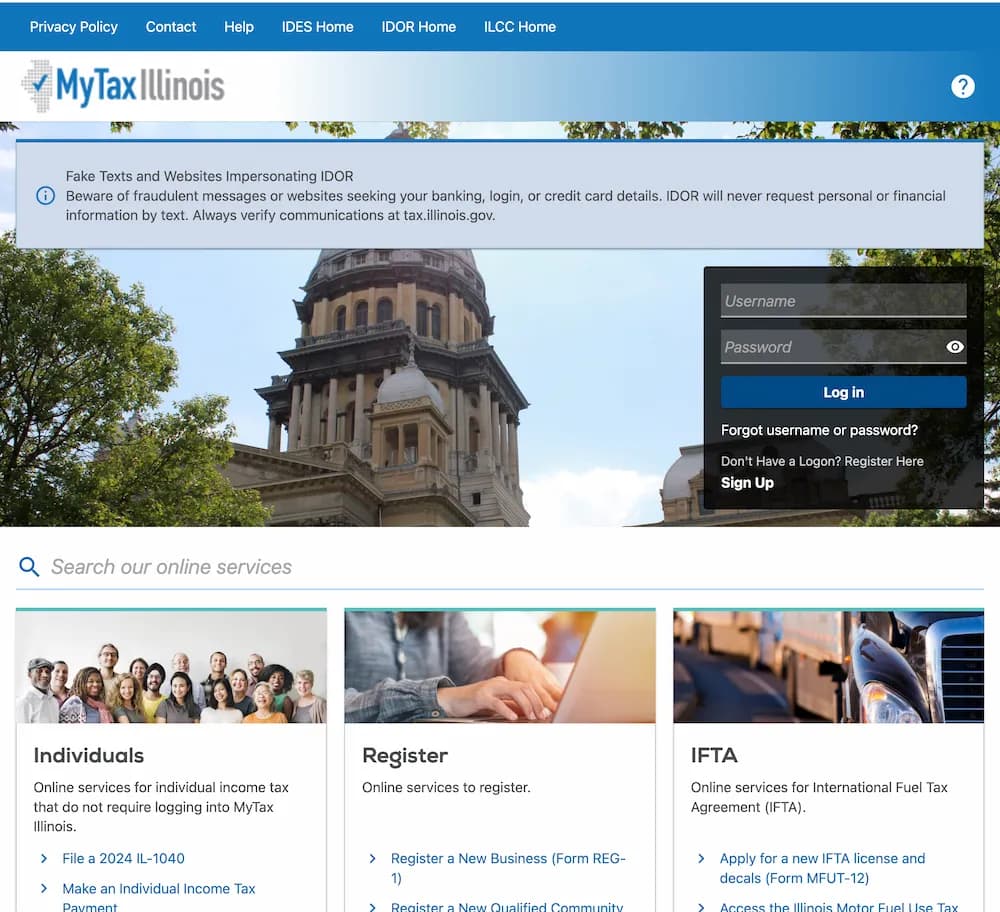
The IDOR portal includes links to Register your business.
Step 4: Obtain the Necessary Insurance for Your Food Truck Business (top)
Insurance is a must-have for your food truck business in Chicago. It protects you from unexpected costs and liabilities.
Here are the key types of insurance you need to consider:
✅ General Liability Insurance
If someone gets hurt on the job or your property is damaged, general liability insurance will protect your business.
For instance, if a customer slips and falls near your food truck, this insurance covers their medical expenses. It also covers legal fees if someone sues you.
The average cost for this insurance is about $42 per month or $500 per year.
✅ Commercial Auto Insurance
Your food truck is a vehicle, so you need Commercial Auto Insurance.
This insurance protects your truck from damages due to accidents, theft, or natural disasters.
It also covers medical bills if someone gets injured in an accident involving your food truck.
On average, the cost for this insurance is around $75 per month or about $900 per year.
✅ Workers' Compensation Insurance
If you have employees, you need Workers' Compensation Insurance.
This insurance helps cover medical expenses and lost wages if an employee gets injured while working. It's required by law in Illinois for businesses with employees.
The average cost for this insurance is approximately $45 per month, which totals $540 per year.
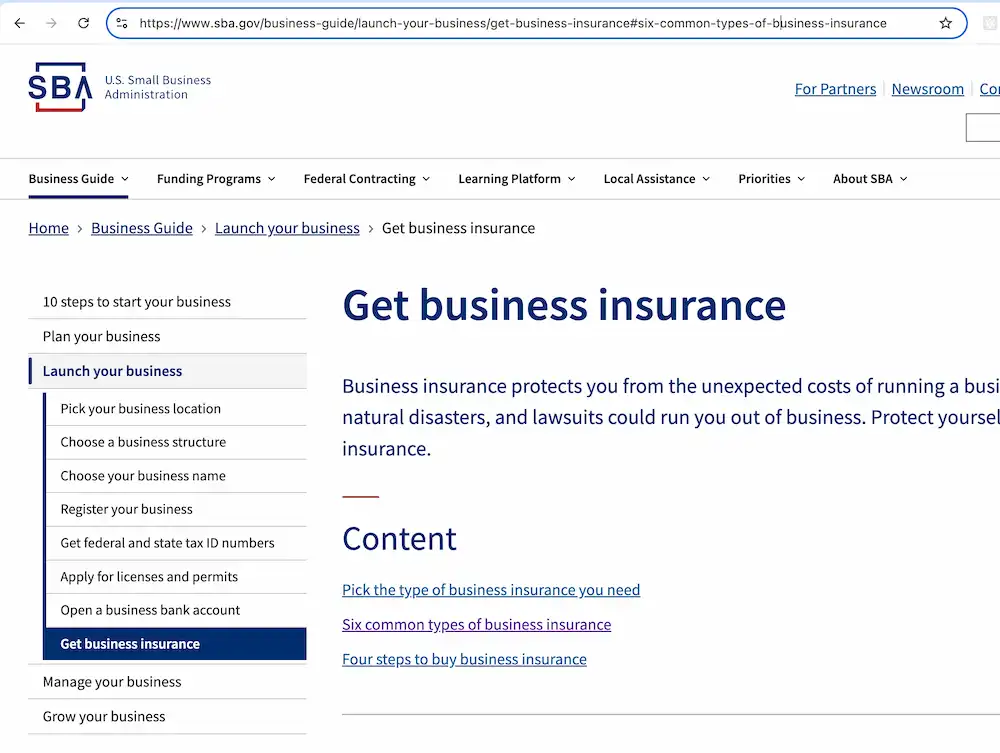
Be sure to check out the Small Business Administration (SBA) website as a resource for food truck insurance options and other business resources.
Step 5: Choose Your License Type (top)
If you're wondering how to get a food truck license in Chicago, it starts with choosing the right type of license. You need to decide between a Mobile Food Dispenser (MFD) license and a Mobile Food Preparer (MFP) license.
Understanding the difference will help you operate your food truck legally and smoothly.
The Chicago Business Affairs and Consumer Protection (BACP) department oversees food truck licensing and provides detailed information between a Mobile Food Dispenser (MFD) license and a Mobile Food Preparer (MFP) license.
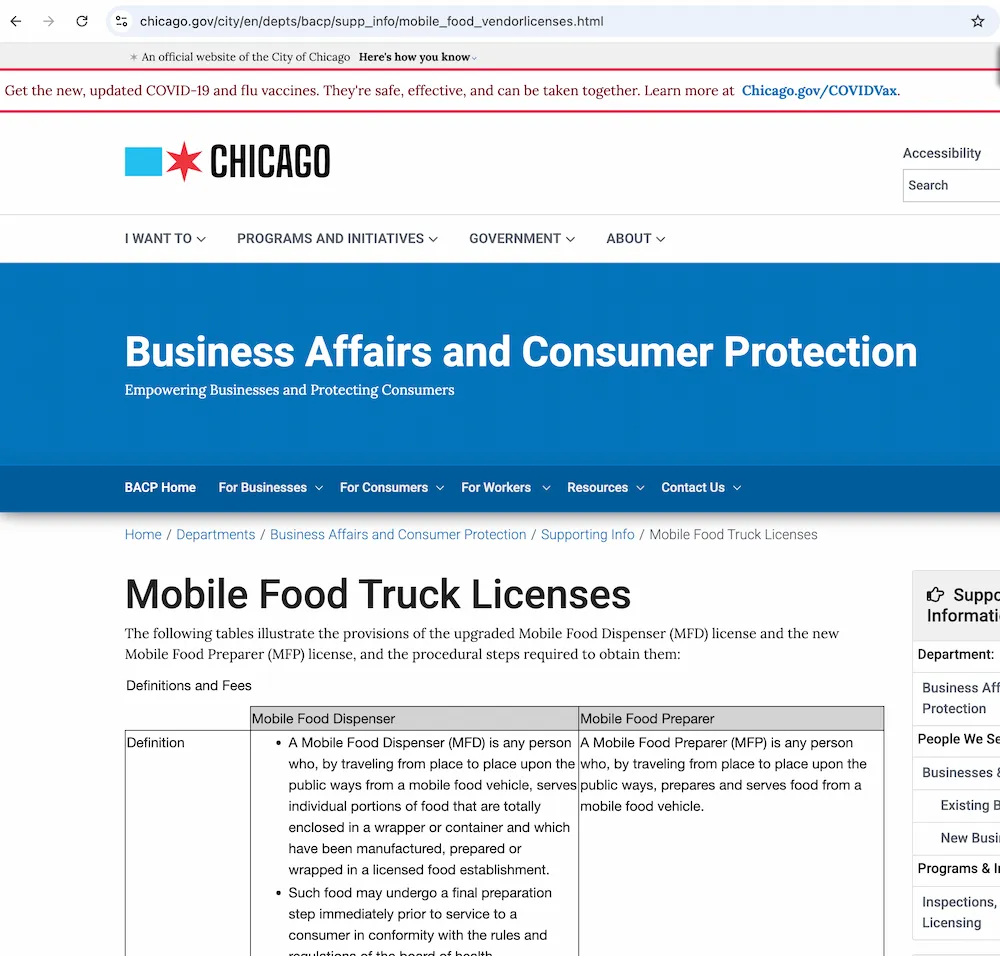
The Business Affairs and Consumer Protection (BACP) department's website lists information for Mobile Food Truck Licenses for Chicago
✅ Mobile Food Dispenser (MFD) License
An MFD license allows you to serve pre-packaged and wrapped food.
This means you can sell items like sandwiches, salads, or snacks that are already prepared and just need to be handed over to customers.
It's a simpler and lower-risk option since you're not cooking or assembling food on the truck.
The recent charges for an MFD license in Chicago are around $700 for a two-year term.
✅ Mobile Food Preparer (MFP) License
An MFP license is required if you plan to prepare and serve food from the truck.
If you're cooking, assembling, or otherwise making food on-site, this is the license you need.
It covers a wider range of food operations, but it also requires meeting stricter health and safety regulations.
The cost for an MFP license in Chicago is about $1,000 for a two-year term.
Step 6: Complete and Submit Your Food Truck License Application (top)
Now that you have decided which license is right for your food truck, it's time to tackle the submission process.
If you attempt to do anything through the Chicago Business Affairs and Consumer Protection (BACP) website, keep in mind that you are expected to create a user account first, which includes providing your email address, setting up a password, and verifying your identity by uploading a government-issued photo ID.
The details of the sign up process are outside the scope of this article, but you can start the process at the following link: https://webapps1.chicago.gov/AccountServices/login.jsp

The Chicago Business Direct portal requires that you sign in or create an account to access business services
✅ Book a meeting with a Business Consultant at the Business Affairs and Consumer Protection (BACP) office in Chicago.
✅ Fill out the Business Information Sheet (BIS) - Pre-Application Form
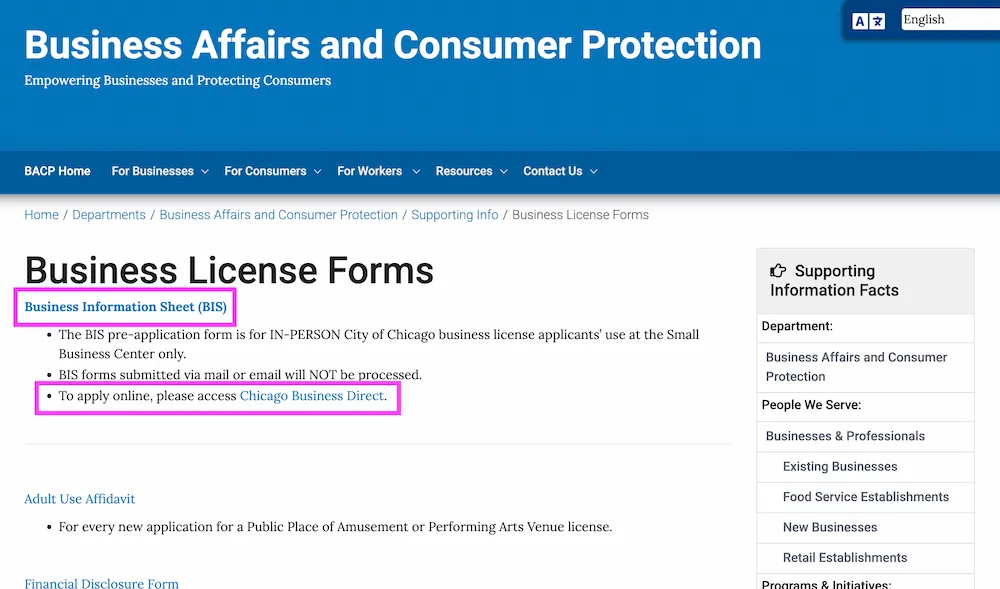
You can use the Business Information Sheet (BIS) link, which leads to a PDF, or you can fill out the form online through the Chicago Business Direct portal.
✅ Bring valid government-issued photo IDs.
✅ Provide your Employer Identification Number (EIN) if applicable.
✅ Don't forget to include information about where your food truck will be kept when it's not in use.
✅ Ensure you have a valid Retail Food Establishment or Shared Kitchen User business license if you'll be preparing food for sale.
✅ If you want to get a Mobile Food Preparer (MFP) license, you need to show a Chicago Food Sanitation Manager Certificate.
Step 7: Get Through Health and Fire Safety Checks (top)
Schedule a health consultation with the Department of Public Health Sanitarian.
Prepare all your paperwork, such as blueprints, equipment specification sheets, and a recent inspection report of your commissary.
It's important to make sure your mobile food vehicle meets all the health and safety standards.
There must be a clear barrier between the driving and cooking areas. Ensure all your equipment is in good working order and meets the required temperature standards.
You will also need to get a fire safety permit if your truck has an engine, an exhaust hood, or a fire control system.
Don't forget to include a $100 check or money order made payable to the “City of Chicago” for the MFV Fire Safety Permit Application Fee.
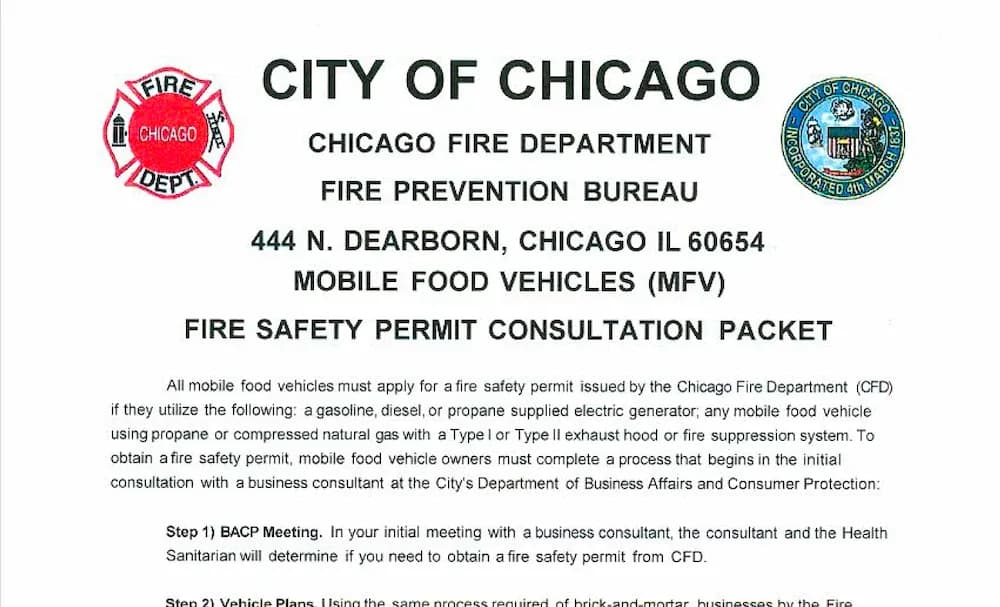
The above is a screenshot of the pdf from the Chicago Fire Department (CFD) MFV Fire Safety Consultation Packet.
Step 8: Have Your Mobile Food Vehicle Assessed (top)
Schedule a Mobile Food Vehicle (MFV) assessment with the Chicago Department of Public Health (CDPH).
If necessary, also schedule an assessment with the Chicago Fire Department (CFD).
During the assessment, your food truck will be checked to make sure it meets all health and fire safety standards.
Ensure that every part of your vehicle is operational and ready for inspection. It's important that everything is accessible for the inspectors to review.
Step 9: Find Prime Locations Where Your Food Truck Can Thrive (top)
Look for areas with lots of foot traffic like parks, busy streets, and popular events. These spots usually have plenty of people walking around, which means more customers for you.
Remember, Chicago has strict rules about where you can park and run your food truck.
For example, you cannot park within 200 feet of the main entrance of a restaurant at street level, except between 12:00 AM and 2:00 AM
Also, you are not allowed to park on privately-owned vacant lots or at vacant buildings. Be sure to follow these rules to avoid any problems.
Step 10: Use Social Media to Market Your Food Truck (top)
Use social media to tell people about your food truck. Share your location and daily specials to keep your audience engaged.
Our Digital Marketing series has great tips on how to use platforms like Instagram, Facebook, TikTok, YouTube, and X (Twitter) to promote your food truck.

Social media is a great way to get noticed and build a loyal following.
Step 11: Assemble a Reliable Crew to Run Your Food Truck (top)
Figure out how many people you need to help run your food truck smoothly. Usually, you'll need at least two people: one to cook and one to serve and handle payments.
Sometimes, having an extra person to help with cleaning is a good idea. Make sure everyone knows their role to keep things running well.
Step 12: Prioritize Effective Waste Management for Cleanliness (top)
Managing waste is very important for keeping your food truck clean and safe. Work with local waste management services like Republic Services for daily waste disposal.
A clean food truck makes a good impression on customers and helps you follow health rules.
Step 13: Ensure Your Food Truck Has Reliable Access to Utilities (top)
Your food truck should have access to water and electricity. Some places offer utility hookups, but you often need a generator and water tanks. Being prepared makes sure you can keep serving your customers without any issues.
Step 14: Provide A Comfortable Dining Area To Improve The Customer Experience. (top)
Set up small tables and chairs to make your food truck more inviting. This gives customers a place to sit and enjoy their meals. Be mindful of space and city rules when setting up your dining area.
A comfortable place to eat improves the overall experience for your customers.
Takeaway (top)
To make your food truck dream come true, follow these steps on how to start a food truck in Chicago.
Make sure you know the rules in your area and also be ready for the seasonal changes in Chicago.

We ❤️ Chicago, IL!
©2025 Cocina Digital Hospitality Group, Inc. All rights reserved.
No part of this publication may be reproduced, stored in a retrieval system, or transmitted in any form or by any means, electronic, mechanical, photocopying, recording, or otherwise, without the prior written permission of the publisher.
We use cookies to enable you to use our site, understand how you use our site, and improve your overall experience.
Cookies allow us to personalize content, track which pages are most popular and least popular, and provide advertising that may be relevant to you.
Please note that cookies that are essential to the proper functioning of the site are required and cannot be disabled.
They are usually only set in response to actions made by you which amount to remembering your settings, a request for services, such as setting your privacy preferences, logging in, or filling in forms.
As such, they are the only cookies that are enabled by default.
You can set your browser to block or alert you about these cookies.
By continuing to use our site, you accept our use of cookies.